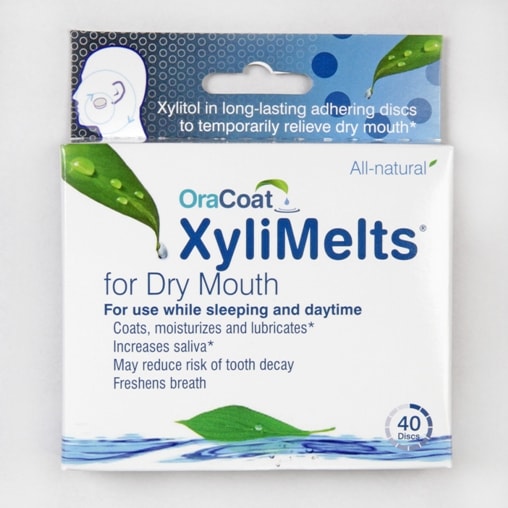
 Dentists are in a unique management position with respect to the treatment of OSAS because they can provide primary care via the prescription of intra-oral appliances in cases of mild to moderate OSAS and, in addition, they can aide in managing the dry mouth that frequently occurs during treatment with continuous positive airway pressure (CPAP), the most common medical intervention for OSAS.
Dentists are in a unique management position with respect to the treatment of OSAS because they can provide primary care via the prescription of intra-oral appliances in cases of mild to moderate OSAS and, in addition, they can aide in managing the dry mouth that frequently occurs during treatment with continuous positive airway pressure (CPAP), the most common medical intervention for OSAS.
 Mouth dryness resulting from leakage of air around the mouth during CPAP is a frequent side effect reported by patients, regardless of the type of delivery system mask used.4 Study results vary but one study suggests that the proportion of patients reporting side-effects may be significantly larger with oronasal masks than with nasal masks.5
Mouth dryness resulting from leakage of air around the mouth during CPAP is a frequent side effect reported by patients, regardless of the type of delivery system mask used.4 Study results vary but one study suggests that the proportion of patients reporting side-effects may be significantly larger with oronasal masks than with nasal masks.5
Regardless of which mask system provides the least leakage, the problem of oral dryness is significant enough that some CPAP users have discontinued therapy because of it. Multiple studies report that between 29-83 percent of patients were non-compliant with CPAP use because of dry mouth.6 Poor compliance resulting from oral dryness occurring because of mouth breathing with nasal CPAP represents a serious challenge to effective treatment and increases the risk of related long term comorbidity when treatment is discontinued.7,8,9,10
In one relevant study that highlights the problem of dry mouth, 275 patients age 45-70 recruited from centers in China, Australia, and New Zealand with a previously documented experience of transient ischemic attack, stroke, or coronary artery disease and OSA (4% oxygen desaturation index (ODI)>12) were randomized into a CPAP arm of a broader study termed the SAVE trial. Subjects in this arm reported mouth dryness as an adverse event (along with nasal symptoms, mask fit, and leaking problems). In fact, the most common CPAP side effect at one month was dry mouth. The problem of dry mouth occurred in 38% of the subjects from China and 58% of the subjects from Australia and New Zealand (overall 42%, 115 subjects of 275).
 Given these results, the authors involved in the above research concluded that: “In our study, increasing side effect score (including dry mouth) was found to be independently associated with reduced CPAP adherence at 12 months”. They further state that “interventions to optimize early CPAP use and minimize side effects may be helpful in improving longer term CPAP adherence in patients with CVD and moderate to severe OSA”.11
Given these results, the authors involved in the above research concluded that: “In our study, increasing side effect score (including dry mouth) was found to be independently associated with reduced CPAP adherence at 12 months”. They further state that “interventions to optimize early CPAP use and minimize side effects may be helpful in improving longer term CPAP adherence in patients with CVD and moderate to severe OSA”.11
Other studies have demonstrated that patterns of CPAP adherence are established very early following treatment initiation, even as early as by the fourth night of therapy – further supporting the need for early control of adverse events such as dry mouth.12
The management of dry mouth occurring during the day is fairly straightforward and a number of OTC products are available to assist the patient in reducing dryness.
Excessive dryness occurring during the night that is not caused by disease (e.g. Sjogren’s disease, other autoimmune diseases, etc.) is more difficult to manage but there are now two products on the market which have documented efficacy for managing excessive night time dry mouth, including dry mouth associated with CPAP use.
XyliMelts® for Dry Mouth (OraHealth Corporation, 13440 SE 27th Pl; Bellevue, WA 98005) is one of these products. It is available as an adhering disc which can be adhered to the gingiva or teeth. A XyliMelts oral adhering disc combines 500mg xylitol, a natural non-fermentable carbohydrate that tastes like table sugar, with cellulose gum (cellulose with added carboxy, hydroxy, methyl, and propyl groups plus a sodium ion) and is lightly flavored with peppermint oil. This material is shaped into a disc that slowly dissolves over time. One side is coated with a vegetable gum adhesive, which provides adhesion to the oral surfaces.13,14
 Empirical assessment has shown that individuals using XyliMelts oral adhering discs during sleep continue to have the taste of the mild mint flavoring upon awakening. This gustatory effect coupled with possible mechanical stimulation provided by the disc itself has been found, via one study, to reduce the perception of oral dryness upon awakening.15 A similar product has also been shown to increase salivation.16
Empirical assessment has shown that individuals using XyliMelts oral adhering discs during sleep continue to have the taste of the mild mint flavoring upon awakening. This gustatory effect coupled with possible mechanical stimulation provided by the disc itself has been found, via one study, to reduce the perception of oral dryness upon awakening.15 A similar product has also been shown to increase salivation.16
A number of unsolicited reviews of XyliMelts discs’ efficacy are posted on the internet. Most of these anecdotes report improvement in night time dry mouth not associated with CPAP use. However, several individuals using CPAP have also described their positive experiences when using the product. These patient anecdotes uniformly praise XyliMelts discs for reducing oral dryness associated with CPAP use.
The following is an example of one such review submitted by an educator in Charlotte, NC.
“I wear a full face mask with BiPap sleep therapy nightly for the past year and one-half. The first few months were unbearable, due to dry mouth from the ventilation of the machine. Dry enough to cause tongue sores and to be unable to lift my tongue to speak. Very uncomfortable the first 4 months. Used various moisturizing mouth washes before bed and upon rising, but it did not help prevent the issues – just offered some relief. I stumbled upon the product when I did an online search for dry mouth due to CPAP and BiPap machines. I ordered it immediately from national online health care provider drugstore. When our provider changed, I could no longer get it through my usual sources. I tried other brands at retail drugstores and they were very unpleasant tasting and did not work. I could not tolerate the taste and took them out. I did another online search for the product which led me to drugstore.com. Please keep this product in stock. I have told many respiratory therapist and sleep medicine doctors to make their patients aware of this product. I also tell other CPAP and BiPap patients. The product helps me to adhere to my therapy without dreading the side-effects of the machine”.
Another reviewer from Nashua, NH reports improvement even with co-use of a humidifier. He/she also comments on concern that CPAP may be contributing to dental caries:
“I use a CPAP with full face mask and had a problem where I’d get dry mouth even with a humidifier. I started to get more frequent cavities because this setup a good environment for the bacteria to attack my teeth. These help to keep my mouth from getting dry. We’ll see if the cavities stop”.
A ‘Marianne’ from Green Valley Arizona (along with several others) notes that she is awakened at night because of dry mouth associated with use of the CPAP. All of these individuals commenting report that XyliMelts use helps to reduce dryness and allows them to get back to sleep. She writes: “this product is GREAT, creates saliva flow, and helps me fall back to sleep when my CPAP machine dries out my mouth and wakes me up. It also produced a better check up with my hygienist with less plaque that is caused by dry mouth”.
When considering the efficacy of any pharmaceutical product, reported anecdotes and case series must be interpreted cautiously. However the above research revealing that CPAP is associated with dry mouth, the studies suggesting XyliMelts oral adhering discs are effective in preventing dry mouth during sleep, and the anecdotal reports supporting the coupling of CPAP intervention with XyliMelts discs as an effective strategy for reducing oral dryness, provide evidence that XyliMelts discs may be a good addition to therapy for improving CPAP comfort. Given that patient compliance has been shown to be directly related to the reduction in dry mouth that occurs during CPAP therapy, the co-use of XyliMelts for Dry Mouth may well contribute to effective long term CPAP use and resulting patient well being. There may also be additional benefit with respect to root surface caries reduction in CPAP users from inclusion of xylitol (which has been shown to reduce risk of disease in this area).
Yaggi HK, et al. Obstructive sleep apnea as a risk factor for stroke and death. N Engl J Med. 2005; 353:2034-2041
Kim JH, et al. Compliance with positive airway pressure treatment for obstructive sleep apnea. Clin Exp Otorhinolaryngol. 2009; 2(2):90-96.
Ryan S, et al. Effects of heated humidification and topical steroids on compliance, nasal symptoms and quality of life in patients with obstructive sleep apnea syndrome using nasal continuous positive airway pressure. J Clin Sleep Med. 2009; 5(5):422-427.
Baltzan MA, et al. Evidence of interrelated side effects with reduced compliance in patients treated with nasal continuous positive airway pressure. Sleep Med. 2009; 10:198-205.
Borel JC, et al. Type of mask may inpact on continuous positive airway pressure adherence in apneic patients. PLoS One. 2013; 8(5):e64382.
Gay P, et al. Ealuation of positive airway pressure treatment for sleep related breathing disorders in adults. Sleep. 2006; 29:381-401.
Bachour A, Maasilta P. Mouth breathing compromises adherence to nasal continuous positive airway pressure therapy. Chest. 2004; 126: 1248-1254.
Weaver TE, Grunstein RR. Adherence to continuous positive airway pressure therapy: the challenge to effective treatment. Proc Am Thorac Soc. 2008; 5(2):173-178.
Hui, et al. Determinants of continuous positive airway pressure compliance in a group of Chinese patients with obstructive sleep apnea. Chest. 2001; 120:17-176.
Engleman HM, et al. Self-reported use of CPAP and benefits of CPAP therapy: a patient survey. Chest. 1996;109:1470-1476.
Chai-Coetzer CL, et al. Predictors of long-term adherence to continuous positive airway pressure therapy in patients with obstructive sleep apnea and cardiovascular disease in the SAVE study. Sleep; 2013; 36(12):1929-1937.
Weaver, et al. Night-to-night variability in CPAP use over the first three months of treatment. Sleep. 1997;20:278-83.
Lee P, Burgess J. XyliMelts time-release adhering discs for night time oral dryness; Abstract accepted for presentation at the Oral Medicine Meeting, May 2009.
Kerr A R, et al. Use of a mucoadhesive disk for relief of dry mouth. A randomized, double-masked, controlled crossover study. JADA, 2010. 14(10):1250-1256.
Burgess J, Lee P. XyliMelts time-release adhering discs for night-time oral dryness. Int J Dent Hyg. 2012 May;10(2):118-21)
Kerr A R, et al. Use of a mucoadhesive disk for relief of dry mouth. A randomized, double-masked, controlled crossover study. JADA, 2010. 14(10):1250-1256.
A.V. Ritter, et al. Tooth-surface-specific Effects of Xylitol: Randomized Trial Results. J Dent Res. 2013 June; 92(6): 512–517.

Stay Relevant With Dental Sleep Practice
Join our email list for CE courses and webinars, articles and more..



